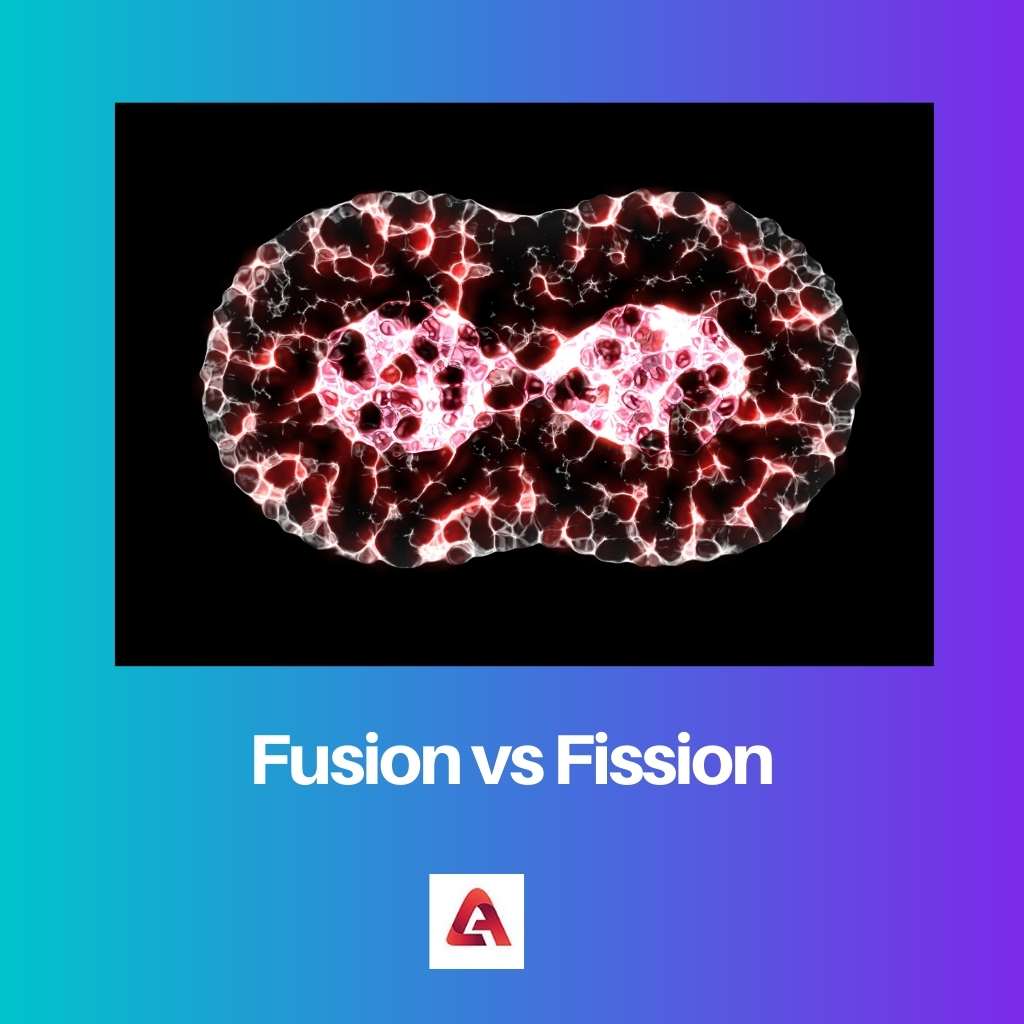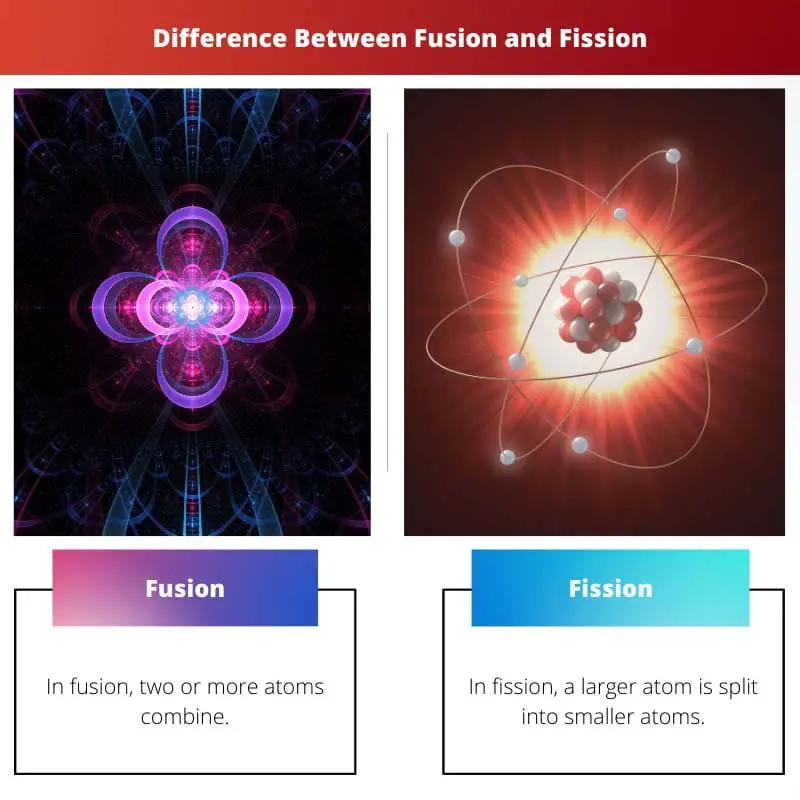The terms fusion and fission are related to the world of science and are associated with nuclear reactions that release or produce energy.
Fusion and fission are processes where chemical reactions between different atomic bodies produce great energy. Though both of these scientific methods create nuclear energy, the processes are exactly opposite to each other.
Key Takeaways
- Fusion combines lighter atomic nuclei to form a heavier nucleus, releasing energy, whereas fission splits a heavier nucleus into lighter nuclei, also releasing energy.
- Fusion reactions require extremely high temperatures for ignition, while fission reactions can occur at relatively lower temperatures.
- Fusion produces significantly less radioactive waste than fission, making it a more environmentally friendly energy source.
Fusion vs Fission
Fusion combines two atomic nuclei to form a heavier nucleus, releasing energy into stars. Fission is splitting a heavy atomic nucleus into two or more lighter nuclei. A neutron splits the nucleus in nuclear reactors, releasing energy and additional neutrons that can split other nuclei.

Fusion is a chemical process where two or more nucleons merge to create a more powerful, larger atom. Thus, the term can be defined as simply combining or merging two or more nuclei.
It is a scientific process combining lighter atoms and releasing much nuclear energy.
Fission, on the other hand, is a completely different nuclear process. In a nuclear reaction, the process is called nuclear fission, when a larger atom is divided into smaller atoms.
Fission breaks an atom into many smaller atoms and neutrons instead of fusion. The energy released in this process is also not as enormous as that produced in fusion.
Comparison Table
| Parameters of Comparison | Fusion | Fission |
|---|---|---|
| Definition | In fusion, two or more atoms combine. | In fission, a larger atom is split into smaller atoms. |
| Energy | It releases an enormous amount of energy. | In fission, the energy is lower in scale as compared to fusion. |
| Harmful | Fusion is not harmful as it is natural. | Fission can be too dangerous. |
| Requirements | To make a fusion reaction, a high temperature and proper environment are needed. | For a fission reaction, less energy is utilised. |
| Chain reaction | It does not involve any chain reaction. | Fission has a chain reaction. |
What is Fusion?
Recent scientific developments have solidified this fact, and mass can be converted into energy and vice versa. Nuclear fusion is an example of that fact.
In a nuclear fusion reaction, two or smaller atoms are joined to make a larger atom. Thus, the number of atoms and neutrons increases after the completion of the reaction.
The greatest example of a fusion reaction is the sun. At the beginning of the twentieth century, questions began on how the sun has continuously produced that amount of heat and light.
Then various theories have been made, and experiments continue to seek the answer.
In 1926, when it was found that the sun is made up of hydrogen and helium, a theory was proposed that it is possible only because of the fusion process. The other instance of fusion that we can find on Earth is the fusing of deuterium and tritium.
A high amount of energy and a suitable environment is required to make a nuclear fusion reaction possible. As a result, an enormous amount of energy is also get released.
The biggest advantage of this nuclear reaction is that it does not produce any harmful greenhouse gas or waste that could damage nature or our world.
What is Fission?
As the name indicates, fission is linked with breaking a bigger thing into smaller or lighter ones. Similarly, a nuclear fission reaction divides a larger atom into smaller ones.
Before the splitting, the larger atom remains unstable and heavier, but the atoms created are stable and lighter after the process.
In this method, a neutron is bombarded onto the heavier and larger atom, and the nuclei of that neutron split into two or more nuclei. A lot of energy is released, and the atoms become stable.
Since this process involves breaking a heavy nucleus into two nuclei, it is termed nuclear fusion.
The energy released in this is ten times more powerful than many chemical reactions but less than the energy produced in fusion reactions.
Unlike a fusion reaction, it does not require a lot of temperatures to initiate the process. The nuclear reaction used in making an atom bomb is fission.
Fission reactions need an artificial environment to happen. So it is not natural. These reactions can be used to harm and cause damage to anyone.
Thus, knowing the consequences of these reactions beforehand is vital. Unlike fission, this process produces a lot of radioactive waste and pollution that are lethal for our survival.

Main Differences Between Fusion and Fission
- Nuclear fusion starts with creating a huge temperature, whereas fission begins when a neutron is bombarded onto the larger atom.
- In fusion, two light atoms combine to make a heavy one. In fission, a heavy nucleus is broken down into medium-sized nuclei.
- Nuclear fusion does not involve any chain reaction, but fission has a chain reaction.
- Fusion is a safe nuclear reaction that does not produce any harmful radiation. But fission is quite harmful to our environment.
- It is impossible to create a controlled fusion reaction as they happen naturally. Since the fission reaction is unnatural, it can be controlled.

- https://ui.adsabs.harvard.edu/abs/1980mit..book…..M/abstract
- https://www.sciencedirect.com/science/article/pii/S0920379610005119

It is great to see an article that provides an in-depth comparison of fusion and fission. Thank you.
What a clear, informative, and educational article. I had a great time reading it and leaned a lot from it.
This is an amazing explanation of the differences between nuclear fusion and nuclear fission.
The information provided here is good but this could be better if the energy potentials of both processes were compared against each other.
I agree with you. A clearer differentiation between the energy potentials of these two processes would be an interesting addition.
I love the comparison table. It really helps understand the differences between fusion and fission in a very clear manner.
Fascinating topic! While I now have some understanding, I still have much to learn about this subject matter.
I find the topic of nuclear energy intriguing and this article provided great insight into the differences between fusion and fission.
This was an amazing read. I learned a lot.